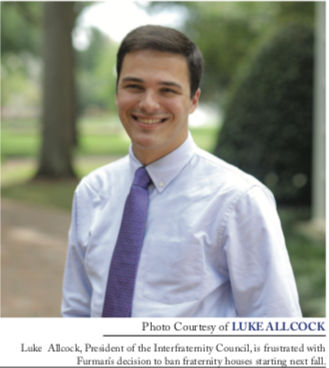On November 21, 2019, Furman’s administration notified the campus community of its new strategic plan for fraternity and sorority life at Furman. The most controversial aspect of the new policy was the decision to “sunset the off-campus housing exemption for senior students to live in fraternity houses starting in Fall 2020.” In other words, Furman would no longer allow students to “live in, or host university-sanctioned activities at off-campus houses,” according to Clinton Colmenares, Furman’s Director of News and Media Strategy.
Almost immediately, Furman’s greek life community mobilized in opposition to the new policy. Jackson Robinson, President of the Interfraternity Council at the time, started a petition on change.org, urging Furman to “listen to their student’s voices regarding fraternity houses.” Within hours, the petition accumulated thousands of signatures. Today, the total count stands at more than 10,000. Nonetheless, Furman’s administration remains steadfast in their commitment , citing “the safety and wellbeing” of students as their “first concern” when The Paladin asked about their reasoning behind the policy.
According to the Administration, the new policy is based on extensive research, statisitcs, and their work with Gentry McCreary, a consultant on fraternity and sorority life. In particular, the University shared two data points that support their decision. First, they note that conduct incidents often escalate when there are fraternity parties, “33.2 percent of student conduct incidents in fall 2017 and spring 2018 happened when there were house parties; 8.3 percent happened when there were parties at third-party venues.” Next, they cite concern about alcohol consumption, indicating that “50 percent of hospital transports of students for alcohol-related incidents came from students who attended a fraternity/sorority event; of those, two-thirds attended fraternity house parties.”
In town hall meetings held in the wake of the announcement of the new policy, several students expressed doubt about the validity of the University’s statistics, and Luke Allcock, current President of the Interfraternity Council, indicated that the University has refused to “expound upon the data points they throw around.” Moreover, he claims that Furman’s new policy will “make students less safe in the end,” calling third party venues where fraternities will now host parties and events “more unpredictable than fraternity houses.”
In addition to safety concerns, however, Jackson and Allcock both expressed their frustration about Furman taking away the last remaining off-campus, social outlet for students. According to Allcock, the houses “facilitate brotherhood” and “serve as way more than just venues for parties.” When asked about his thoughts on the Administration’s commitment to working with students “to develop more options for meeting and social event space on and off-campus,” Allcock said, “We have a meeting space. It’s the houses. Not sure why Furman wants to be so incredibly involved in every aspect of our lives. We joined our Greek organizations to find values that are not shoved onto us every second by Furman.”
Misunderstanding has run amuck in the dialogue between Furman’s administration and student leaders of Furman’s fraternities , and unfortunately, the situation seems unlikely to improve in the short-term or the long-term. Although the Administration has “composed a steering committee on the issue that… will form additional working groups of both affiliated and unaffiliated students and make recommendations to the University on future steps,” Allcock—who will be on the committee—suspects that what he calls an “unproductive cycle… of pretending to listen” will continue. At the end of the day, it seems that Furman’s fraternity leadership is still not willing to give up hope that they might keep their houses. On the other hand, the Administration insists that “the decision is final.” For now, expect gridlock to continue, but eventually, something has to budge.
In conclusion, only time can tell if Furman’s policy will be successful in achieving its goals of safer and more robust student experience for affiliated and non-affiliated students alike. In the meantime, fraternities are already feeling the effects of the policy. According to Allcock, “recruitment numbers were lower this year and constantly throughout rush potential new members were bummed about the [Administration’s] decision.” In sum, only 59 students accepted bids to join fraternities this year, paling in comparison to previous years where more than 80 students accepted bids.




































